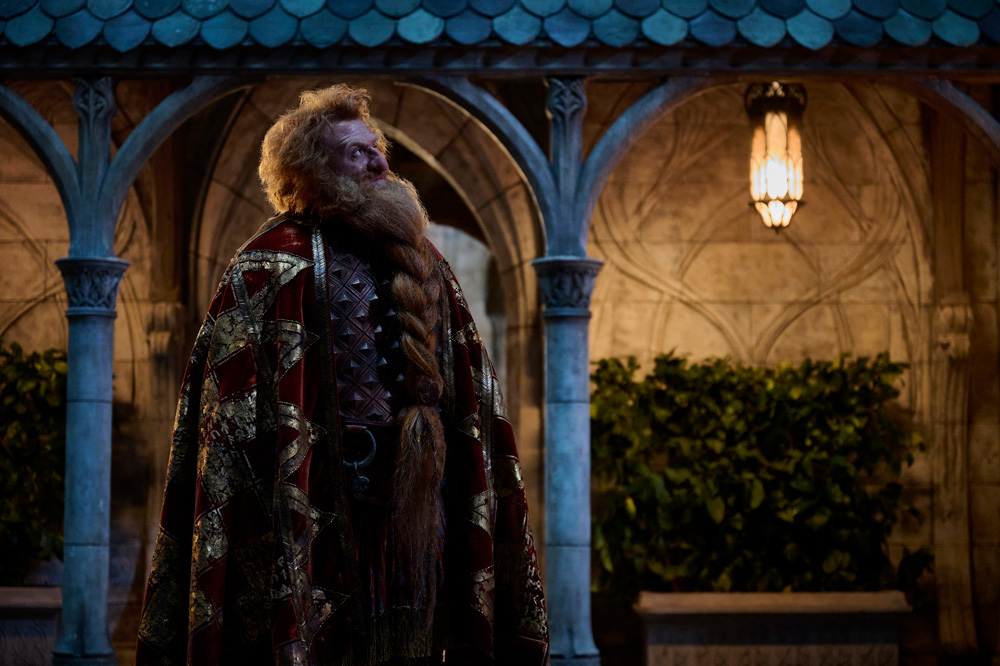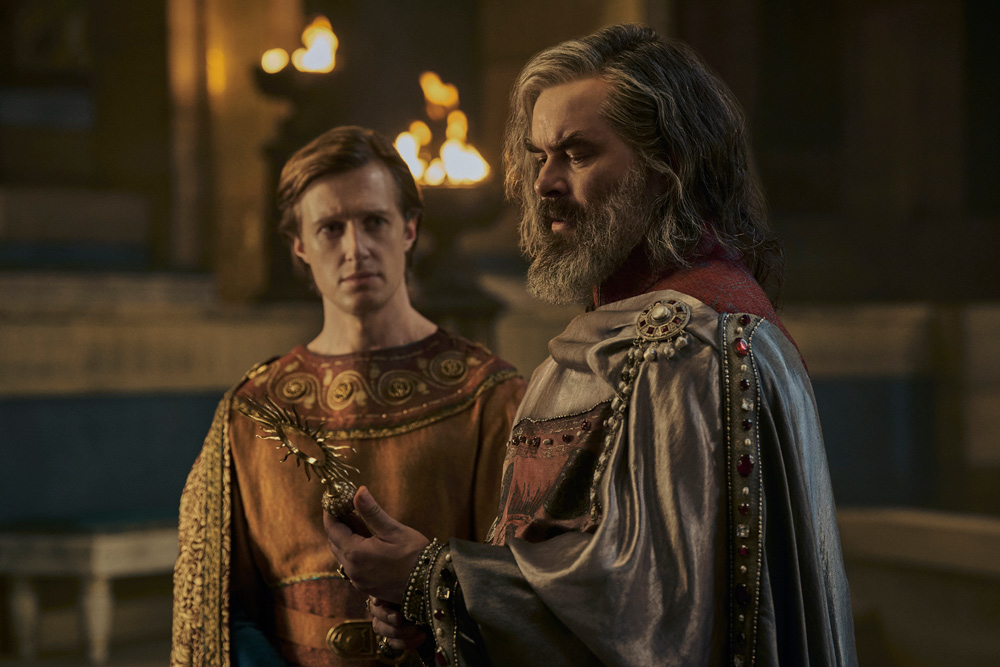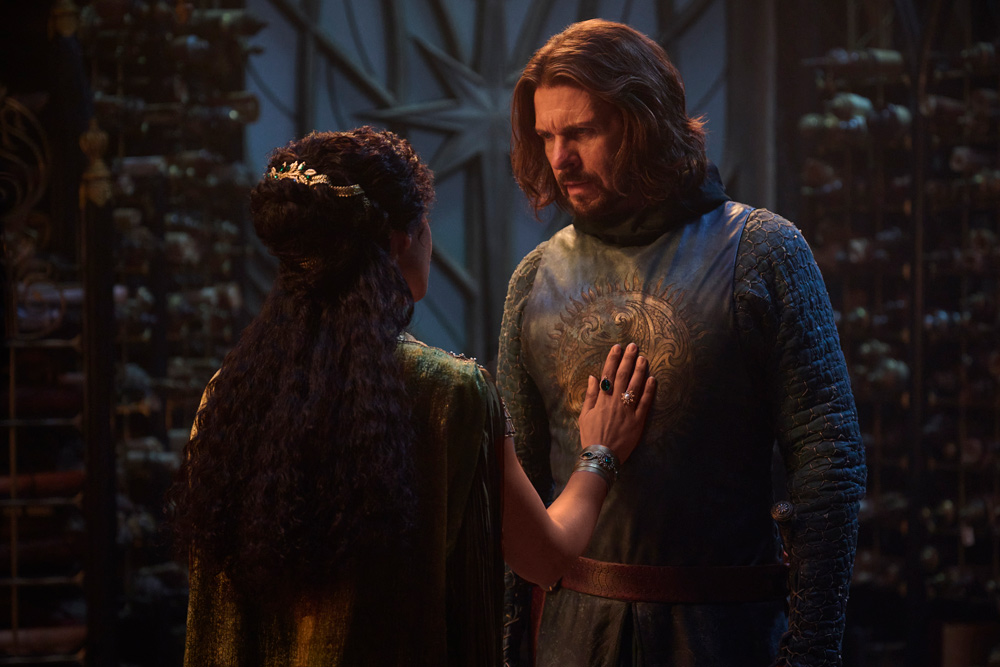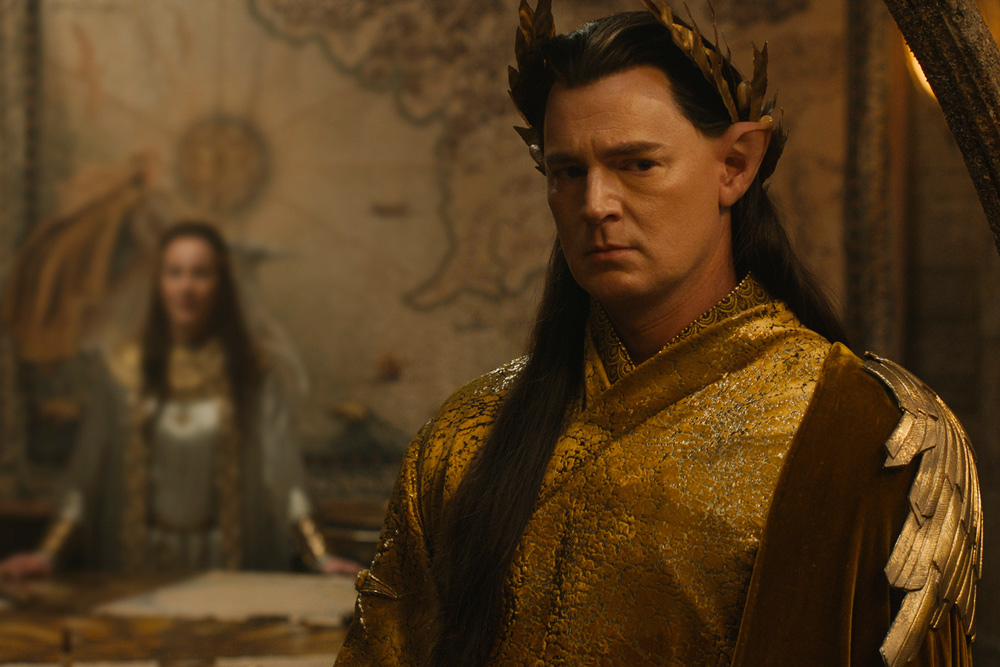
In Khazad-dûm, Durin has had the ring for all of five minutes when he starts acting strangely. “All is soon to be well,” he tells Narvi and Prince Durin, who do not feel remotely assured by his words or actions. He tells them to dig through one of the foundation walls to find a passage to the outside and when the Prince and Narvi stand there dumbfounded, he takes a pickaxe and does it himself. Of course he uncovers a shaft. We can see the shape of this story a little bit better as it’s unfolding and it’s clear that Sauron manipulated or took advantage of events that threatened both the elves (the dying of the golden tree of Lindon) and the dwarves, (the earthquake that sealed off Khazad-dûm from sunlight) and uses it not just to manipulate the forging of the rings, but to convince the elves and dwarves to put them on. It’s clever, but by necessity, it requires a massive compression of the timeline. In the original texts, these events played out over centuries. We’ve spent some time defending this approach (most recently in last week’s podcast) because having events play out over millennia kills any sense of urgency in a filmed version, but even we find it a little goofy that the rings have an immediate and noticeable effect on their wearers. Soon the king is uncovering shaft after shaft and the great city is once again bathed in sunlight. We’re sure purists found it offensive, but we laughed at the “Khazad!” “DUM!” call and response. Even Prince Durin is won over by his father’s actions. Disa and the other stone singers, however, are clearly bothered by them.
Later, Celebrimbor is having a little Elven cocktail party with the Dwarves in presence. The occasion is the unveiling of the Doors of Durin, created by both Celebrimbor and Narvi, illustrated with Ithildin, completely unbreachable, “and guarded by a password known only to friends.” Sauron, to his credit, has no patience for the happy talk and niceties at which Celebrimbor seems to excel. He leaves the gathering early and chastises Celebrimbor for droning on too long, claiming he finds it difficult to be festive when people are suffering under Mordor’s rise. Their relationship is slowly becoming contentious, with Sauron pushing harder and Celebrimbor starting to show a little bit of spine. “It is a game you play, is it not?” the jewel-smith asks him pointedly (and correctly) “Sowing seeds in other’s minds and then convincing them that the fruit is of their own thought?” Sauron further pushes him on the making of the rings for men. Celebrimbor remains completely opposed to the idea, arguing that men are far more susceptible to corruption. Ironically, Sauron argues for the goodness of mankind and the ability of men to rise above their darkest impulses. He suggests they find nine of the purest, most incorruptible men and grant them rings of power, making some sort of hand-wavey comment about “the perfection of the three, thrice perfected,” which is one of those things where it feels like the show is working too hard to explain things that don’t need explaining. They could have just as easily written a scenario where they find the potential ring-bearers first and make the rings based on the number they arrive at. Celebrimbor remains firm in his opposition, however. Sauron eventually stops pushing him on the matter and announces that he will just have to make the rings himself. Celebrimbor could have him banished from the forge if not all of Eregion at this point, but he doesn’t. His opposition to making more rings is clearly not total.

In Númenor, Pharazôn is obsessing over the immortality of the elves and thinks they’re taunting men over it. “No matter how high we climb, some things will be forever withheld from our grasp.” Kemen urges his father to put aside his obsession with the elves and Make Numenor Great Again. The king, clearly going a little nuts at the moment, reveals to his son that his own mother predicted that he would “come to ill ends.” He then tells him he has a task for him. Meanwhile, Elendil urges Miriel to fight for her throne, noting that there are still plenty of the faithful in the city. She asks him what he saw in the palantír when he grabbed it during the coronation. He tells her of a vision of himself fleeing the city. She interprets this to mean that the visions she had of Númenor being engulfed by a wave are no longer the future, and reasons that Pharazôn is meant to be the king. This is a common theme in Tolkien, the misreading or misunderstanding of signs and portents; how miscommunication and lack of context can lead to disaster and ruin. She orders him to go back to his ship and serve the king. Unfortunately, the king, through Kemen and for some reason Eärien, is forcing all loyalists to the queen to be stripped of their rank in the Sea Guard. This scene plays out way too long, but at least it gives us more time to hate Kemen and Eärien, who have unfortunately gone from being thinly characterized characters to sneeringly villainous caricatures overnight. Valandil and the other sailors insist on thanking their captain and Elendil leaves before the situation escalates. Eärien, who’s got to be some kind of idiot, tries to tell Valandil they’re still friends. He gives her the blow-off she deserves.
In Lindon, Gil-galad receives Celebrimbor’s letter informing him that the forge has gone cold in Eregion. He lays it on a little thick and the High King seems unconvinced by the letter. His advisors are urging him to send his troops to Mordor to fight Adar, arguing that Celebrimbor’s letter proves that Galadriel’s suspicions were wrong. All of this seems a little wonky from a timeline perspective, not to mention unlikely. We realize there’s no interstate highway system but for this letter to fool anyone, we’d have to believe there’s absolutely no other travel or communication between the elves of Lindon and Eregion. The High King has ring-induced visions of violence and ruin and his advisors are getting impatient. “Are you truly prepared to wager the future of Middle Earth on the whispers of that ring alone?” Meanwhile, Elrond and his party are high-tailing it back to Lindon with the news of Adar’s advancement.
In Khazad-dûm, Disa is voicing her concerns to Durin about his father’s ring and how it’s affecting his actions. Later, they go to the marketplace to buy their daughter a “tuning crystal,” which looks perhaps ironically a lot like a palantír. Like those seeing stones, this one leads Disa to an unfortunate truth. While we find it a little difficult to believe that there are massive unexplored caverns within steps of the marketplace, we suppose it could be argued that the city is full of unexplored caves and passages. This one appears to be housing the Balrog or possibly the Watcher in the Water. They’re strictly “bowels of the earth” type creatures, but this one is evidently being stirred by the king’s excessive mining activities and/or Disa’s singing.

The king is meeting with emissaries from the seven Dwarf kingdoms and he tells them about the promise of the rings and their “power over earth, power of over rock, power to shape the destinies of all dwarves forever.” Narvi seems disturbed by this rhetoric. Durin tells them all to go back to their lords and tell them they can have this power, for a price. Later, in a meeting with Narvi, he tells him to abandon the restrictions on mining that he wrote decades before in an escalating pursuit of all the gold to be found in the mountain. He has a form of greed sickness for which the dwarves (and also dragons) are susceptible. His son barges into the meeting and says that all mining has to be stopped because Disa found an ancient evil under the mines. To be fair to the king, that does sound a little nuts. He tells his son that they have barely taken a thimble of the riches within the mountain and orders the digging to continue.
In Eregion, the ring-making goes a little wonky as tools start flying about the room in a manner that doesn’t feel random. It’s to the credit of the direction that it took a second to figure out that Celebrimbor’s aide Mirdania was wearing a ring and that she had slipped into the Unseen World, rendering her invisible. Celebrimbor somehow manages to figure out what’s happening, grabs her, and gets the ring off her finger. She is traumatized and describes a world… well, pretty much exactly like the one Frodo saw every time he put on the ring in the film trilogy: mists and darkness and flames, ending with a vision of what sounds like Sauron’s evil form. She described its skin as made of flame and its eyes as pitiless and eternal. Annatar moves to soothe her. Celebrimbor is frustrated by their clumsy attempts and Annatar once again asks him to lend his expertise. It seems clear that Sauron literally can’t make the rings as well as Celebrimbor can. Just then, Prince Durin arrives unannounced to talk to him about his father’s ring.
The prince informs Celebrimbor that his father won’t share his rings with the other dwarf lords unless they promise him half of the output of their mines. Durin asks him outright if there’s something going on with the ring and Celebrimbor rushes to assure him that there isn’t. Pressing further, Durin asks him how much he actually knows about Annatar. One thing you won’t be able to tell Celebrimbor when this is all over is that he wasn’t warned. Repeatedly. Annatar get Mirdania alone and works his wily ways with her. He admits that he has seen the Unseen World and suggests that the darkness she saw there was due to Celebrimbor somehow. She’s clearly smitten with him, so she winds up buying this line of bullshit. She is speechlessly flattered when he tells her she looks like Galadriel.
After meeting with the prince, Celebrimbor asks Annatar if he did anything to the Dwarven rings that would explain Durin’s complaints, but the fact of the matter is, if he’s asking that question, part of him already knows the answer. Once again, the warnings are in front of him, but he is manipulated away from them. Annatar suggests that Celebrimbor’s lie to Gil-galad tainted the Dwarven rings and urges him to come clean with the High King. Of course he knows Celebrimbor won’t do that, because he fears having his forge taken away. In the space of a few minutes, Celebrimbor comes completely around and agrees to forge the nine rings for men.
Durin heads back to Khazad-dûm and tells him that there is evil afoot in Eregion. King Durin pays no attention to his son’s concerns, praises him for partnering with the elves to save the kingdom and reinstates him as his heir. Disa is furious at this turn of events and makes her husband swear to never put on the ring. The show is extremely vague about time, but it sure feels like Durin put on the ring and went crazy in about the space of a week. Given the audience’s familiarity with the Peter Jackson films (we’re putting the book readers aside because they’ve either already made their peace with this or they’re still railing against it), this seems like an odd choice. Frodo carried the ring through three very long films before it finally turned him, and that one was supposed to be the most evil and powerful of all the rings. Nevermind that Tolkien himself said the Dwarves were particularly resistant to the rings’ effects, this is odd pacing.
In Númenor, the faithful gather for a memorial service to those who have gone onto that far green country under a swift sunrise. Elendil and Valandil are there. Kemen shows up with soldiers and declares that the shrine is condemned and everyone needs to disburse. This goes about as well as you’d expect. We can’t imagine what Kemen thought was going to happen when he made it his mission to torture a bunch of grieving soldiers, but he barely managed to get out of there alive, paying back Valandil’s mercy by stabbing him in the back. Elendil is arrested for fomenting an uprising.
Celebrimbor calls a staff meeting and accuses his jewel-smiths of sloth and hubris, which is not the best way to motivate people, we would think. He tells them that the nine must balance out “the entire project” and “redeem the seven.” He gets all hardass on them and threatens to fire anyone who doesn’t give their all. Annatar takes the good cop approach and soothes the concerns of the jewel-masters while Celebrimbor has a panic attack in the other room. Charles Edwards is doing great work this season. We initially had some issues with the casting of a clearly middle-aged actor as an ageless elf, but he brings considerable weight and gravitas to the role, which makes his increasing desperation all the harder to watch.

The orcs are in sight of Eregion by the time Elrond reaches Lindon. He tells Gil-galad that Galadriel was right and it’s nice for someone to FINALLY say it. That it’s Elrond makes it all the sweeter, but there’s no time to linger on it. Gil-galad puts on his Grumpy Boss act and says that Lindon cannot face Sauron and Adar together. This seems…premature? Granted, it’s not like we have knowledge of the numbers of troops available to the High King, but the orc army is clearly not well-appointed. These aren’t the armored orcs with sophisticated weaponry of the LOTR films. They’re wearing rags and hauling Galadriel around in a cage made of sticks on wooden wheels. Speaking of which, it was fun to see how legitimately intimidated of Galdriel the orcs are, and how bold she is with them in return. The second her cage was unlocked, she leaped out into the crowd of orcs, who all flinched or backed away. Granted, she’s killed a LOT of orcs. She attempts to take Adar hostage to secure her freedom, but he tells her that they have a common enemy and should team up, which is an interesting turn of events. In the original stories, Sauron invaded Eregion, but it appears that this version will have Adar invading Eregion in pursuit of Sauron. Either way, it’s not looking good for the Elves of Celebrimbor’s fair city.
Next: “Where Is He?“
VMAs 2024: Taylor Swift in Christian Dior Next Post:
VMAs 2024: Sabrina Carpenter in Archival Bob Mackie
Please review our Community Guidelines before posting a comment. Thank you!



